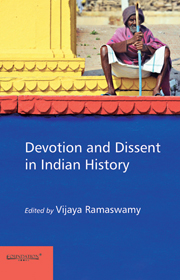Book contents
- Frontmatter
- Dedication
- Contents
- List of Tables and Figures
- Foreword
- Preface
- Introduction: Locating Devotion in Dissent and Dissent in Devotion A Thematic Overview
- Introduction
- 1 Parsing of Devotion and Dissent
- 2 Dissent and Protest in Early Indian Buddhism with Special Reference to Devadatta
- 3 Devotion and Dissent in Hunter's Bhakti
- 4 Devotion and Dissent
- 5 Dissent Within
- 6 Women in Love
- 7 Dissenting Voices
- 8 Dissent in Kabir and the Kabir Panth
- 9 Devotion and Dissent of Punjabi Dalit Sant Poets
- 10 Protest and Counter-protest
- 11 Fakirs of Bengal
- 12 Music in Chishti Sufism
- 13 Dissenting the Dominant
- 14 Devotion and Dissent within the Catholic Church in Late Colonial Bengal
- 15 Narratives of Travel, Voices of Dissent and Attacks on the Colonial Church Fabric of the European Missionaries
- 16 Devotion and Dissent in Narayana Guru
- 17 Sree Narayana Guru's Idioms of the Spiritual and the Worldly
- Contributors
- Index
1 - Parsing of Devotion and Dissent
from Introduction: Locating Devotion in Dissent and Dissent in Devotion A Thematic Overview
Published online by Cambridge University Press: 05 October 2014
- Frontmatter
- Dedication
- Contents
- List of Tables and Figures
- Foreword
- Preface
- Introduction: Locating Devotion in Dissent and Dissent in Devotion A Thematic Overview
- Introduction
- 1 Parsing of Devotion and Dissent
- 2 Dissent and Protest in Early Indian Buddhism with Special Reference to Devadatta
- 3 Devotion and Dissent in Hunter's Bhakti
- 4 Devotion and Dissent
- 5 Dissent Within
- 6 Women in Love
- 7 Dissenting Voices
- 8 Dissent in Kabir and the Kabir Panth
- 9 Devotion and Dissent of Punjabi Dalit Sant Poets
- 10 Protest and Counter-protest
- 11 Fakirs of Bengal
- 12 Music in Chishti Sufism
- 13 Dissenting the Dominant
- 14 Devotion and Dissent within the Catholic Church in Late Colonial Bengal
- 15 Narratives of Travel, Voices of Dissent and Attacks on the Colonial Church Fabric of the European Missionaries
- 16 Devotion and Dissent in Narayana Guru
- 17 Sree Narayana Guru's Idioms of the Spiritual and the Worldly
- Contributors
- Index
Summary
Introduction
This imaginative theme will, of course, be parsed in several ways in the essays that follow but what intrigues me about it is the various ways in which it can be parsed.
Dissent without Devotion
To begin with, one could speak of dissent without devotion. And to this category would belong, surprisingly, both the atheists and the transtheists of the Indian religious scene. Thus, we have dissent sans devotion when the atheist denies the very existence of God and thereby of devotion to Him. But even here we may be need to be careful, for one must distinguish between what is personal or impersonal in its ultimate formulation, and the personal or impersonal quality of the devotion towards the object of that devotion, whether personal or impersonal. Four possibilities emerge. First, the possibility that the object of the devotion is personal in nature and our attitude towards it also personal: as when we pray to a god or goddess with devotion – the very core of bhakti. Second, the possibility that the object of devotion is impersonal and our attitude towards it is also impersonal. Thus, nirvana, as the summum bonum of Buddhism, is something Buddhists would be devoted to but, at least in Theravāda Buddhism, the goal is impersonal in nature and the attitude of the seeker after it is also impersonal, the way a scientist may approach an object of investigation. Similarly, in Advaita Vedanta, the ultimate reality is pure consciousness and one seeks to ‘know’ it. This knowing is not in the nature of personal knowledge, although it is a person who acquires this liberative knowledge.
- Type
- Chapter
- Information
- Devotion and Dissent in Indian History , pp. 21 - 30Publisher: Foundation BooksPrint publication year: 2014
- 2
- Cited by

